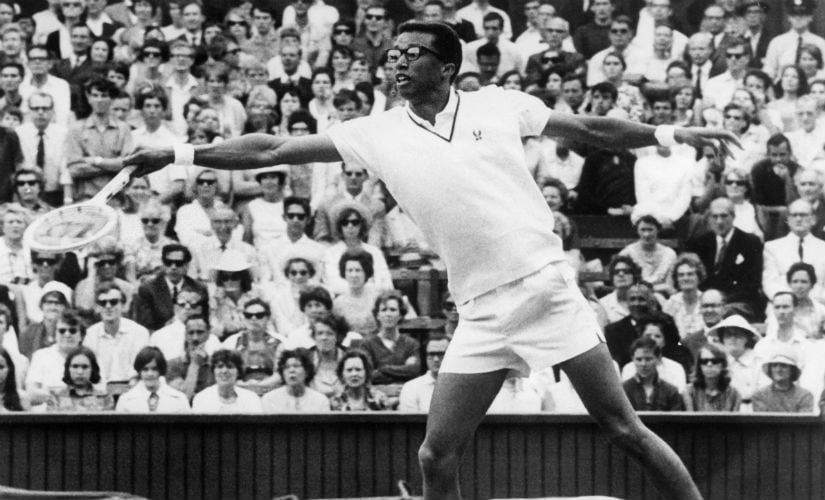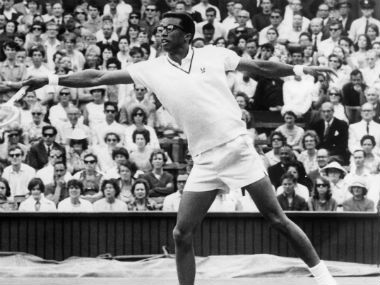For the next two weeks, starting Monday, the Arthur Ashe stadium will be the grandest theatre for tennis. Stories of triumph and defeat, of unbridled joy and heartbreaking despair, will be played out as the US Open 2018 unravels. Hopefully, what will also be remembered is the story of the man who lent the stadium, the biggest tennis-specific venue in the world, his name. Fifty years ago, when tennis broke down barriers between amateurs and professionals, Arthur Ashe won the first US ‘Open’ tournament to cross over the racial divide in 1968. He was the first African-American man to win a Grand Slam, and remains only one of the two to have ever done so. Ashe added to his major tally by winning the Australian Open 1970 and Wimbledon 1975. But his life’s work and victories went well beyond the marked white lines on the tennis court. He was a champion of the people. Ashe was born in July, 1943 in Richmond, Virginia – the capital of the Southern Confederacy during the American Civil War. The war was long over and slavery abolished, but the segregation was a way of life for coloured people. There were separate parks, restaurants, toilets, seats on buses earmarked for them. Owing to police atrocities, children were taught by their parents to be passive and not to fight back. Ashe spent the rest of his life in non-violent, mostly silent, protest. [caption id=“attachment_5021301” align=“alignnone” width=“825”]  File image of Arthur Ashe. AFP[/caption] Arthur Ashe Senior, his father, looked after the Brookfield Park, Richmond’s largest blacks-only park, and the family stayed in a cottage on the grounds. Arthur Ashe Junior shunned the basketball courts and baseball grounds in the 18-acre playground and opted for playing the white man’s sport tennis instead. “My potential is more than can be expressed within the bounds of my race or ethnic identity,” Ashe was quoted as saying later in life. Though Ashe’s ambition was not defined by his race, the roadblocks in his path were motivated by it. As a teenager, there were local tournaments he could not enter because it was restricted to white players. When he moved to St Louis, to further his tennis education, the only indoor facility he was allowed to use was the Armoury in Midtown. The courts were made of hardwood: the quick-paced surface needed sharp game. It is believed that this is where Ashe picked up the secrets of his serve-and-volley trade. In 1963, Ashe became the first African-American to win the junior US national title and he won a tennis scholarship to the University of California, Los Angeles. The same year, he became the first African-American to play Davis Cup for the country. The spindly, bespectacled Ashe looked, and behaved, like a tennis scholar. His game could sometimes be erratic, but his demeanour was always immaculate. The late Bud Collins, one of the greatest tennis commentators, called Ashe the ‘thinking man’s tennis player.’ Despite his credentials though, Ashe was far from being a favourite at the US Open 1968. Politically and socially, it was a year of turmoil in the United States. Martin Luther King Jr had been assassinated in April that year. Civil Rights movements and Black Power movement were gaining momentum in the country. At the 1968 Olympics in Mexico City, 200m winner Tommie Smith and bronze medalist John Carlos, unfurled the black power salute on the podium.
In this charged atmosphere, Ashe fired his opening statement of racial equality at the US Open. He had already won the US amateur championships, but in a field laden with decorated pros like Rod Laver and Ken Rosewall, Ashe didn’t exactly start as the favourite. In a draw of 128, he was the only black player — ‘as noticeable as the only raisin in a rice pudding,’ according to Ashe.
Ashe defeated Australian pro Roy Emerson, winner of 12 Grand Slams at the time, in the fourth round and made an unexpected run to the title round. While a lot of the players, including his opponent in the final Tom Okker, had switched over to metal racquets, Ashe wielded his wooden frame. He defeated Okker 14-12, 5-7, 6-3, 3-6, 6-3 to win his first major. Since he was still an amateur, and a lieutenant in the US Army, the prize money of $14,000 was handed over to Okker. While the US Open win confirmed his tennis talent, it also gave him a more confident voice to tackle on the bigger issues. “True heroism is remarkably sober, very undramatic,” he said. “It is not the urge to surpass all others at whatever cost, but the urge to serve others at whatever cost.” In an age, where sports stars were more politically active and outspoken, Ashe was a quiet revolutionary. He was one of the founding members and became the first president of the Association of Tennis Players – the men’s tennis governing body till date – in 1972. The ATP showed the strength of a players’ union by boycotting the 1973 Wimbledon. Earlier, in the year, the International Lawn Tennis Federation had banned Yugoslavia’s Niki Pilic for refusing to play a Davis Cup tie against New Zealand. In protest of his suspension, 81 top players, including 12 of the 16 seeds, withdrew from the competition. Ashe worked actively towards the uplift of discriminated communities through education and sport. He set up the African-American Athletic Association and helped raise funds for inner-city tennis centers. In 1991, he was among the delegation of 31 African-American athletes that visited South Africa as the country prepared for racial integration. He wrote A Hard Road to Glory, a definitive history of black sports, after six years of research. He was arrested for participating in an anti-apartheid protest in Washington DC in 1985. He kept up the fight for human rights even in the last few months of his life. In September 1992, five months before his death, he was once again arrested for protesting against the crackdown on Haitian refugees. “Arthur was a voice for all the minorities, and that goes for women, too,” American player Pam Shriver once said, “He brought a level of conscience to the game, whether he was speaking on South Africa or inner-city minorities or exclusionary policies anyplace. Arthur’s influence on tennis didn’t fade after he left the sport.” He was immortalised in his hometown with a statue on Monument Avenue. Ironically, the tree-lined street was conceived as a memorial site for the confederate generals – those who advocated slavery in the southern states. Amidst the equestrian statues of Robert E Lee, JEB Stuart, Jefferson Davis, stands the bronze figure of Ashe, encouraging moderation and tolerance. The Arthur Ashe stadium, the centre court at US Open, also stands as monument to his story and values, which are just are as relevant in today’s world, increasingly divided on social, political and religious lines.


)

)
)
)
)
)
)
)
)



